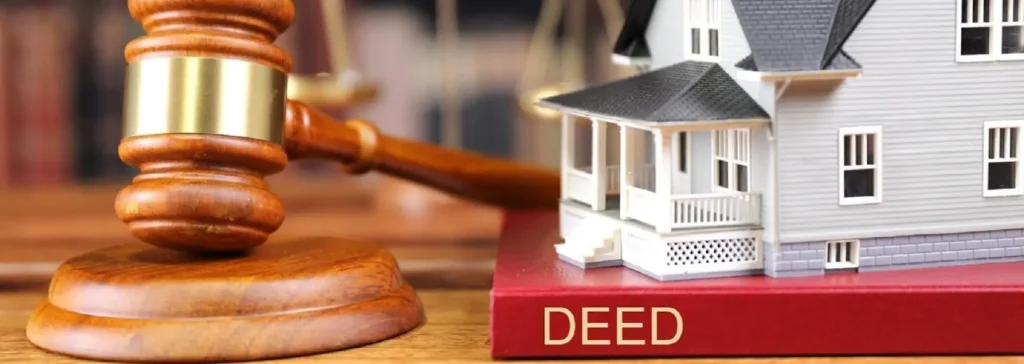
Test your deed awareness! How many of these questions can you answer before reading our thoughts?
Q. Does a New Homeowner Get the Deed on Closing Day?
Probably not. Most new homeowners walk away from the closing table with the keys, not the deed. After closing, the deed goes to the county recorder’s office. That office could be called the County Clerk’s office, the County Recorder, or the Recorder of Deeds Office.
How long does deed recording take? This depends on how busy the local recording office is. A call to the office can get the new homeowner a general timeframe.
After the recording is done, a closing attorney or title company will send the new homeowner their copy of the deed.
In short: While a deed, once signed and notarized, can be filed immediately, new homeowners generally must wait for their official deeds to come in the mail after closing. It might take between two weeks and three months for the city or county clerk to record a deed.
Q. Does the Recording of the Deed Mean the Buyer Now Owns the Home, Free and Clear?
That’s not what a deed does. A deed is a legal document that represents a transfer of property ownership from one party to another. The deed itself does not represent that real estate is free and clear of liens or defects.
To be sure the title is free and clear, the home’s new owner needs to have a title search done. This occurs before closing in a normal real estate sale.
If the transaction involves taking out a mortgage, the lender further safeguards the integrity of the title buy taking out a title insurance policy. The new homeowner can get an additional title policy that covers the buyer.
Q. Why Isn’t Recording an Assurance of a Valid Deed?

Generally, the recorder of deeds does not examine a deed’s validity. The recorder only ensures that the correct procedural elements are all present. The recorder’s job does not include legal analysis or proofreading for errors. This means the county records will have, now and then, deeds with mistakes on them.
See the Section below on “mistakes to avoid” for information on how deeds may be corrected with the county recorder where the property is located. And if you are unsure if some element of your deed is missing accurate information, consult with a local real estate attorney.
Needless to say, deed recording errors can really mess things up for people who own property. And yes, from time to time, county deed recorders have knowingly committed wrongs. For instance, in 2016 a clerk in Cook County, Illinois was indicted for taking a bribe in return for adding someone’s name to a deed.
Q. What’s the Point of Recording a Deed With the County?
Recording a deed in the county makes it a public record. This means the ownership of the property is available for anyone to look up. For example, the owner of the home can go to the county website and check to see that:
- The deed is recorded;
- The deed is indexed correctly so people can look it up; and
- No one else has attempted to transfer the deed.
This matters because deed fraud can affect any of us. Home snatchers are known to forge new deeds, impersonate true homeowners, and falsely authorize home title transfers.
Safe title stewardship is a homeowner’s ongoing responsibility. Many counties are trying to help, by offering auto-alerts that let owners know if anyone makes a claim against a home’s deed.
Q. Is Notarizing a Deed an Absolute Requirement?
Yes, it is. A deed has formal requirements and this is one of them. Counties will only accept notarized deeds.
Notarizing means the parties to the transaction are witnessed when signing the document, which is then stamped with an official notary seal. Only a notarized, recorded deed gives public notice for a valid and complete transfer of ownership.
In theory at least, notarization prevents fraud by verifying the identities of people who transfer their titles.
The notarization process differs by state. The recorder’s office in the county where the home exists has all the procedural details.
Q. Can Homeowners Transfer Their Home Deeds Without a Lawyer?
Yes. You can transfer a deed yourself without a real estate lawyer. The deed must adhere to your state’s legal regulations to be valid.
In all states, a real estate deed must be in writing, must be notarized, and must be filed, with the correct fee, with recorder in the county where the property is located. Then it’s a matter of waiting for the official recording of your deed.
At Deeds.com, we’re committed to providing dependable, up-to-date deed forms for people who wish to prepare their own deeds. Our forms adhere to each jurisdiction’s procedures, including the supplemental parts that the states and the county clerks expect to receive.
That said, some deeds and situations require particular expertise. A warranty deed, for instance, is more complex than a simple quitclaim. We recommend seeking your lawyer’s advice, even if you prepare your own legal instruments.
Q. For New Owners Who Want to Record Their Own Deeds, What Are the Common Mistakes to Avoid?
A deed will not represent a valid transfer unless it precisely identifies the property and the parties involved with the transaction. When trying to record their notarized deeds, people sometimes leave something out. Here are some common slip-ups:
- Incorrect or missing legal description. The legal description of the new deed has to match the old deed, and it’s vital to make sure no tiny errors creep in during a new recording. The names of the parties must also be perfectly spelled on the deed. In some cases where mistakes are minor, a correction deed can fix a mistake.
- Missing consideration language. The deed shows that value is being paid for the property.
- Missing granting clause. Language of the deed must show that one owner is conveying the property to the next.
- Missing people. The deed must be signed by the person transferring the property. It should be clear who is signing over the deed, and who is receiving it.
- Incorrect recording fee. Filers should check for any local fee updates and have the right amount of money for the fee.
- A notary public’s commission was expired, or the witnesses didn’t follow state requirements.
- Recording in the wrong county. The recording has to be done in the same county as the home’s location.
- Lack of legal competence to sign over the property.
Also be aware that the deed’s recipient must actually receive and accept it for the property transfer to be complete.
Q. What Should the Homeowner Do If the Deed Was Never Properly Recorded?
If the deed is not recorded properly, then legal ownership itself is in question. A person who occupies the home without a valid deed is a resident, not an owner.
A person needs to hold a properly recorded deed in order to sell or refinance the home. If the prior owner still has a claim on ownership, that person’s debt could be encumbering the home. Indeed, that prior owner is still the owner, with the right to sell the home to someone else. And if that someone else records the deed before the current resident does, then they — not the current resident — will become the legal owner.
Sound confusing? The basic point is simple. Recording a deed is absolutely essential to ensure legal ownership changes hands.
Generally, buying a home with a mortgage means that the title transfer is vetted. But transferring a deed in other situations can bring up questions about deed recording. Any questions about a deed that wasn’t properly recorded should be directed to the title company or a real estate lawyer promptly, and the issue dealt with as soon as possible.
Q. When Is Professional Legal Advice Important?
Always. Deeds are the documents that represent a shift in rights and duties from one party to another. Neither this website nor any other can constitute legal advice — because each person’s legal situation depends on their own set of facts. Our articles are meant for general informational purposes only. We appreciate your taking the time to read them and increase your deed literacy!
Supporting References
Evette Zalvino for the New Western Brokerage Services blog: How Long Does It Take to Record a Deed in 2023? (Jan. 3, 2023).
Deeds.com: Seven Common Title Problems in Real Estate Deals (May 26, 2020).
And as linked.
Photo credits: Deed by Nick Youngson CC BY-SA 3.0 via Pix4free; courthouse via Pexels by Thomas K.
